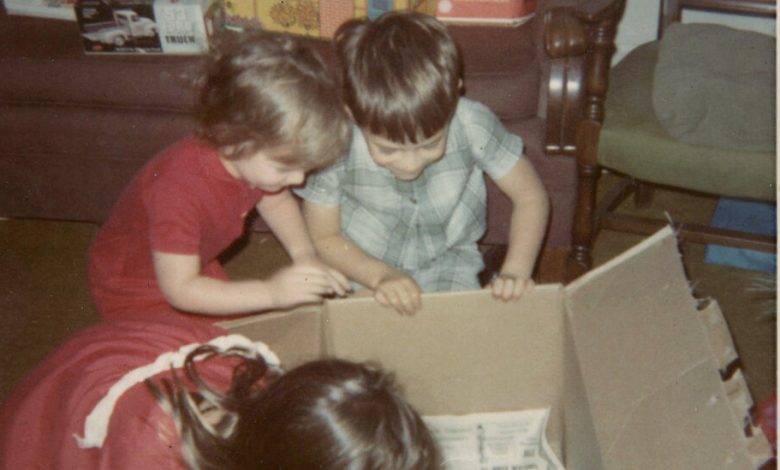What Happens When the Happy Memories Fade

My happiest Christmas memories take the form of snapshots, or the briefest of video clips, though in most cases no actual photographic documentation exists. Even when I study on them, even when I work in earnest to call them up again in some fuller form, they remain only flashes. Such memories exist entirely as fragments, freeze-frame likenesses of ephemeral joy:
The held breath just before my husband pulls down the creaky attic ladder in the hallway outside our sons’ bedrooms. That midnight pause, year after year, as he listens for any stirring behind their closed doors.
The Christmas tree we installed outside the front window the year our middle boy, barely toddling, wouldn’t stop eating the ornaments, and the Christmas tree we encircled with chicken wire the year our first puppy wouldn’t stop eating the ornaments.
The giggling from our oldest son’s room long before first light because his brothers always climbed in bed with him as soon as they woke up.
Our children dressed in bathrobes and towels in the Christmas pageant. This snapshot comes with a soundtrack: “There. You look just like a shepherd,” my husband is saying. “I look like a guy with a towel on his head,” our youngest son is saying back.
The whimpering box under the tree one long-ago Christmas morning. My brother and I are speechless, but our sister, not quite three, is exultant. “I got a puppy!” she is saying. Every year I think of the wonder in my baby sister’s voice: “I got a puppy!”
There’s an actual photograph of that event, a picture of the three of us peering into the box that held a very small, very sad baby dog, but all the rest are just the barest fragments of memory, something that once existed in sprawling, multisensory extravagance but is now refined to its truest essence: one brief, shimmering instant of gladness.
Whatever may happen to the details of long-past joys, however thoroughly they may vanish, the joy itself always seems to linger in the end.
Christmas comes on with its twinkle lights and its bustle and its beloved tale of angels and frightened shepherds and wise men following an uncommonly bright star. Christmas comes on, and I am surrounded by these moments of pure, distilled happiness that have trailed me through this season across the decades.
Our children are grown now, my husband and I hurtling toward old age, and so I linger in such flares of memory, a meteor shower flickering as brightly as the homemade ornaments on our tree that sparkle with the glued-on glitter of Christmases past.
I have had my share of grieving seasons. Decembers of raw loss or the unbearable certainty of a coming pain. Decembers of loneliness or fear or worry or some other kind of trouble. And I know there will be more lonesome Decembers to come. More grief. It’s what happens with time.
I can bear that thought only because I also understand that no matter how impossible it may be to believe, a tiny shard of joy always pricks again. Some surprising enchantment, some sudden mirth — somehow they always shine in the ashes.
Children surrender to the deliciousness of anticipation without reserve, and so this season of waiting is a season for children. They are not, as Auden knew, waiting for the miraculous birth. The lucky ones — those who have no knowledge of illness or hunger or cold or bombs — are waiting for nothing so grand as the arrival of God. They are waiting to wake into a morning of wonders, the fulfillment of all child-desperate hopes.
The utter deliciousness of waiting is a feeling we rarely allow ourselves as adults. For us, waiting is too often merely the terrible kind of uncertainty. The waiting for biopsy results, or whether we’ll be in the next round of layoffs, or news of family in a town hit hard by disaster. Is it because we know what children do not? The melancholy of Christmas afternoon, the whiff of sorrow lurking behind every joy as surely as joy waits at the edges of every sorrow?
Among the few Christmas photos that survive from my childhood, there’s a picture of my brother and me waiting at the top of the stairs at our grandparents’ farmhouse. It’s Christmas morning, so early the window behind us is still dark, and it must be unusually cold because I am wearing my footie pajamas beneath the new red nightgown my mother made me every Christmas.
There is no wild holiday abandon in this picture. Billy and I are waiting at the top of the stairs for the adults to tell us we can come down. I don’t know how long we’ve been waiting there, but it might have been for some time. In our family, waiting for the adults to get into place meant waiting for not just our parents and our grandparents but also our great-grandmother. Two of these beloved elders moved slowly even in haste, but all would have insisted on being present to watch the delight dawn as we spied our surprises under the tree.
Maybe it was their way of reclaiming, if only for those few minutes, the pleasure of anticipation. We were waiting to see what surprises Santa had brought us. They were waiting to see the looks on our faces when we found them.
For just that bit of time, the magic was ecumenical, bringing us all into its circle of light. Like the flash from a cube on my father’s Instamatic camera, it lasted only a moment. Even then the Kodachrome colors were already beginning to fade, leaving just that one scrap of brightness to carry through the years.
Margaret Renkl, a contributing Opinion writer, is the author of the books “The Comfort of Crows: A Backyard Year,” “Graceland, at Last” and “Late Migrations.”
The Times is committed to publishing a diversity of letters to the editor. We’d like to hear what you think about this or any of our articles. Here are some tips. And here’s our email: [email protected].
Follow the New York Times Opinion section on Facebook, Instagram, TikTok, X and Threads.




